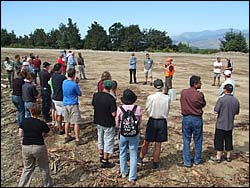Social learning
Research Status: Ongoing |
AGM 2005 - Spooners Ridge |
Introduction
Social learning is an approach to working on complex environmental problems, particularly those with high degrees of uncertainty, lots of interested parties and disagreement around causes, effects and even desired outcomes. Many of the questions in catchment management fall into this category.
Social Learning is not, however, what many people confuse it as, - learning by people 'out there' about the important things we 'in here' think they should know. That is information dissemination, advice, or even indoctrination. At times it may be necessary to straight out tell people 'how it is' - but this is not Social Learning.
Social Learning, as an approach to complex problem solving, has emerged in recent years alongside other approaches such as adaptive management and systems thinking. (In fact it includes the core essentials of both of these). In a nutshell it is about creating situations where people can learn collectively to improve a situation. For Social Learning to support resolution of the kind of complex problems we are talking about in ICM it implies particular types of thinking, learning, and interactions.
The kind of thinking required is essentially Systems Thinking. This is about having an appreciation of the characteristics of systems, i.e., that each element will affect the operation of the whole, parts of the system are interdependent etc. The focus of systems thinking is therefore on interaction. Furthermore, Systems Thinking requires a shift of mind. It looks at underlying systemic structures and beyond discrete events and patterns of behaviour. Finally Systems Thinking in the environmental management context is about developing in-depth knowledge about programs and policies and their organizational implications. The purpose of a System Thinking based inquiry is to seek leverage, seeing where actions and changes in structures can lead to significant and enduring improvements.
Because of the high degree of uncertainty in the kind of problem situations we are talking about, and also because most of these problems have suffered from 'silo' thinking. The kind of learning that is required is active, experimental, and examines the assumptions around the problem "what do you mean it is a water scarcity problem - it is a water allocation problem isn't it?" Being active and experimental means taking an adaptive management approach to policy and management - or if you prefer - a "learning by doing approach". This means applying the concept of experimentation to the design and implementation of natural-resource and environmental policies - working out what your assumptions about the whole system are in the beginning, taking action and monitoring and assessing the effects in order to make adjustments. This all relies heavily on the reflective ability of the people and the system, and improving reflection in environmental management and decision making processes is one of the key challenges of Social Learning.
Finally it would not be 'social' if it was not about people and their interactions. Because we are dealing with problems with many stakeholders with differing views, responsibilities, and knowledge about the system (including science, management agencies and people making decisions on-the-ground), Social Learning has to be about how to bring people together. Particularly it is about bridging gaps that are usually problematic - such as between science knowledge and management decisions, or between agencies and communities). To make these connections happen there are a variety of opportunities (termed 'platforms'). In the ICM programme for instance these have included one-to one meetings, the AGMs, the CRG, the Learning Groups, the Travelling River project, the I-matrix etc. Another big challenge for making Social Learning work is how effective these platforms are not only at promoting interchange but at achieving the harder aspects of Social Learning - promoting a systems thinking approach to problems, getting meaningful reflection on the assumptions about the problem, and setting up an ongoing experimental monitoring approach to solutions.
A final comment on Social Learning would be that it is something that happens over a long period of time - not at single one-off events, and the 'platforms' that support it can often only deliver on one or two aspects at a time.
Research Results
What Social learning work has been done in the ICM programme?
As mentioned above, a number of initiatives in the programme have a social learning element to them.
These include: The CRG, The I-matrix work that Antony Cole carried out with the Community Reference Group, the Travelling River project, and most recently the development of Learning Groups. We have learnt quite a bit about the barriers and opportunites for Social Learning through these intiatives and to some extent the Learning Groups represent an attempt to make the most of that learning.
In terms of learning from our social learning efforts some things are becoming apparent. In a broad brush way some suggestions include:
- There is a need to use a facilitator (and the more different the stakeholder perspectives that are engaged with, the more important this is)
- The facilitator needs some independence from any particular solution
- The capacity of stakeholder membership to learn (i.e. how open people are to different viewpoints, are they strategic or tactical thinkers, how much time
do they have to put into the initiative) - Group size and composition are important
- Institutional or community support is useful if learning is to be translated into action.
Recent Publications
Recent Presentations
Primary Contacts:

|
Will Allen
Email Phone: 03 321 9600 More details» |
Institute Landcare Research |
Expertise participation, multi–stakeholder processes, participatory evaluation, networking |

|
Margaret Kilvington
Email Phone: 03 3256700 Fax: 03 3252418 More details» |
Institute Landcare Research |
Expertise collaborative learning, facilitation, evaluation |